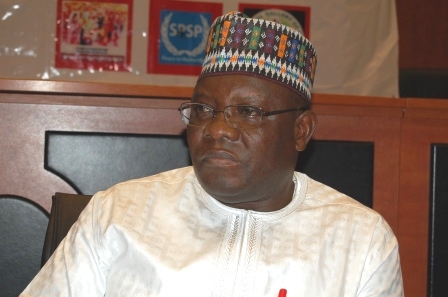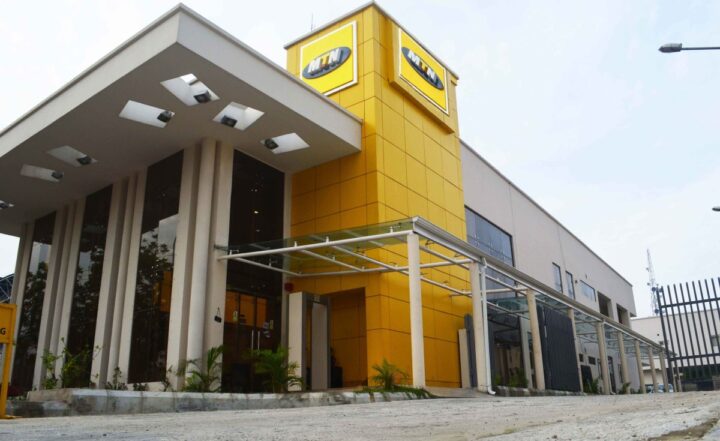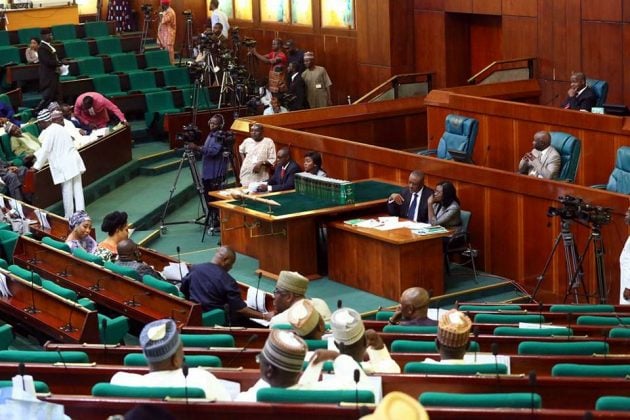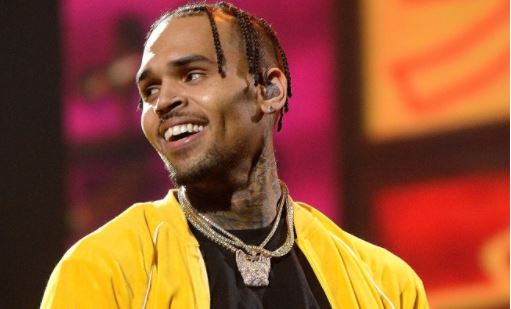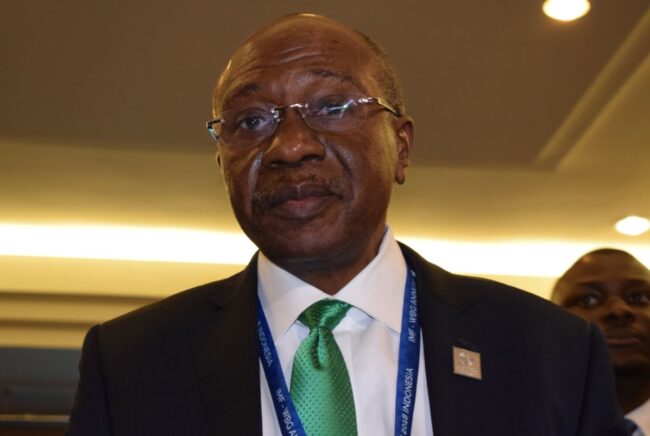Allegations of lopsided recruitment, forgery and fraud have rocked Nigeria’s Institute for Peace and Conflict Resolution (IPCR) since President Muhammadu Buhari appointed Bakut Tswah Bakut as the acting director-general, investigations by Global Sentinel revealed.
With evolving conflicts and insecurity across the six geo-political zones of the country and highly anticipated general election three weeks away, the institute with the core mandate to “promote research and facilitate conflict prevention, management and resolution within Nigeria and Africa” has no substantive director-general and governing council chairman. President Buhari has yet to renew the tenure of Oshita after the expiration of his first term in office.
Findings revealed that since Bakut assumed office in August 2018, the institute has been on either lock down or slow motion due to supremacy battle between him and members of the governing council who were to supervise the activities of IPCR.
Sources who were concerned about the development informed Global Sentinel that apart from the alleged refusal of Bakut to submit himself to the governing council for scrutiny, the crisis rocking the institute include questionable recruitment and appointment, corruption, suspicious qualifications and suspected forgery case.
Advertisement
The acting director-general has been accused of possessing dual citizenship with two different dates of births in his British and Nigerian passports while he was said to have gained employment without first degree and NYSC discharge certificate.
Further investigations unveiled a deepened power play crisis that have affected the IPCR to function effectively as the hub and indispensable reference point for federal government, international organisations and donors for conflict management, insecurity, violence prevention and mitigation. Stakeholders who spoke on the condition of anonymity stressed that the issue at stake is at core of Buhari’s administration tripod of economy, security and anti-corruption.
Several documents obtained by our reporter including petitions to the ministry of foreign affairs (MFA), office of the secretary to the government of the federation (OSGF) and Independent and Corrupt Practices Commission (ICPC) as well as internal correspondences between the acting director-general and other actors in IPCR indicated a state of uncertainty in the affairs of the institute.
Advertisement
Sources also alleged that “there is credible information that Bakut has no formal letter appointing him as acting director-general since the exit of Oshita. Bakut has no formal letter requesting him to takeover in acting capacity either from SGF or MFA.
“This is one of the pointers that he was verbally elevated and planted to do a messy job for some unknown sources. Unfortunately, for them he is not qualified and lacks the capacity to lead the institute”.
According to multiple sources, trouble started when Bakut sidelined other members of the IPCR’s governing council in the affairs of the institute but only deferred to the chairman of the council, Mohammed Abba Aji, who had already decamped to the Peoples Democratic Party (PDP) as the senatorial candidate for Borno central.
The council members were particularly irked by the fact that they were not only side stepped by Bakut who prefers to deal directly with Abba-Aji. They were also angry that the council chairman had on several occasions failed to honour meetings he summoned while Bakut has allegedly refused to cooperate with other members of the council including: Carol Arinze-Umobi, Peter Afum Agasokoa, Jummai Mahoumed, AS Yusuf, Aloysius Nwibo, Hauwa Baba Ahmed, Adeolu Adewumi, and Hon. Alex Ikor.
Advertisement
The members of the Council have in several instances expressed reservation over the actions of Bakut whom they accused of taking unilateral decisions without consulting the management of the Institute or the Council in accordance with the Act setting up the IPCR.
“He has been running a one-man show with probably the support of the outgone chairman of the council, senator Abba-Aji, and when he left, Bakut quickly sought the support of Khadija Bukar Abba-Ibrahim, the immediate past minister of state for foreign affairs, (who also resigned later on to contest the forthcoming election) to carry out his illegitimate activities,” a source said.
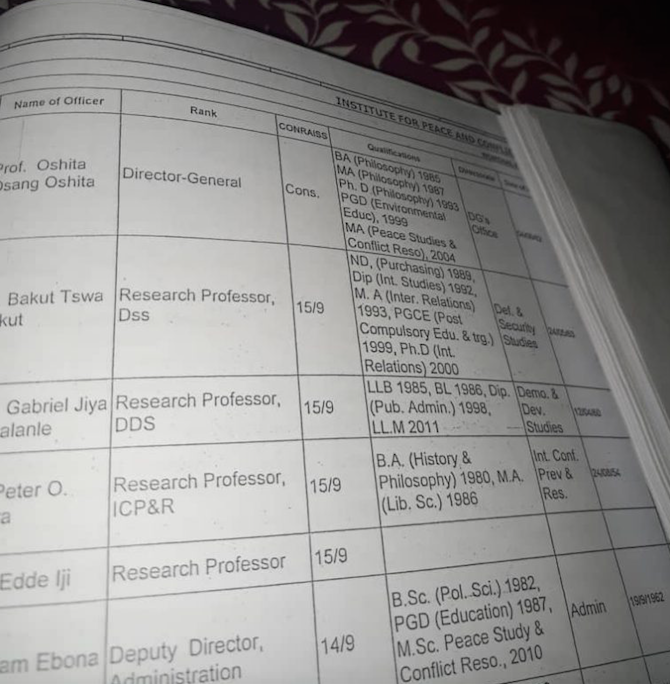
Things came to head in December 2018 when the council members, enraged by what they perceived as constant disregard for the Act setting up the Governing body, declined the “summoning” order to attend a ‘valedictory’ IPCR meeting by Bakut at the instance of Abba-Aji.
Advertisement
In a response letter on December 3, 2018, the members of Council stated:
“Sequel to the notification from the Acting DG sent to the members on November 29, 2018 at the behest of the Chairman for a ‘valedictory’ IPCR meetings to be convened on December 20, 2018, individual Council members at the joint committee meetings of finance and establishment held on December 3,2018 regrettably expressed their unavailability to converge on the said date due to several conflicting and demanding schedules. However, members are equally concerned based on precedents that the Chairman may at the last minutes not be available for the meeting he initiated.”
Advertisement
Unperturbed, Bakut cited that the provisions of IPCR establishment Act 34 of 2007 under the supplementary provisions relating to the council, Section 2 and 4 “confer on the chairman the prerogative of summoning of council meeting either at his own instance or, by the requirement of a certain number of council members”.
“In all cases, the Act provided that the chairman shall preside at such meetings, except when he is unable to preside at such summoned meeting,” Baku stressed in a memo to the council members on December 11, 2018.
Advertisement
Unilateral Decisions: Controversial approvals, appointments and recruitment
With Abba-Aji’s resignation, Bakut allegedly sought the nod of Abba-Ibrahim to carry out actions that according to sources, would ordinarily require the approval of the governing council.
Advertisement
Sources informed Global Sentinel that Bakut had since then embarked on ‘illegal’ recruitment spree and appointment of new directors without informing the council.
One of such recruitment invitation reads: “The Management of Institute for Peace and Conflict Resolution(IPCR) hereby invites you for Interview on Saturday,12th January, 2019 by 12 Noon at IPCR Complex, Abuja.”
“After sending discreet invite to people on Thursday, they still went ahead to send address on Friday. Even after receiving advice from council to stop it. He has also appointed some directors. Presidency and government must sit up,” a source within the institute said.
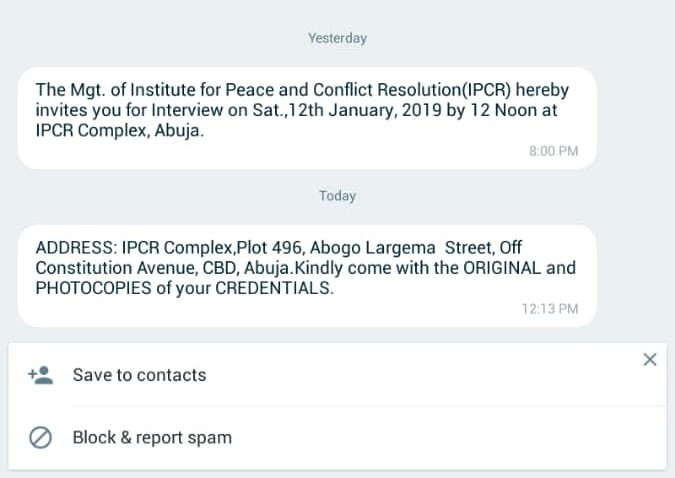
Prior to that, the acting director-general, in a letter to Abba-Ibrahim, asked her to swiftly endorse his plans before she resigned from cabinet on January 9, 2019, to contest house of representatives seat in Yobe state.
In his memo to Abba-Ibrahim on December 21, 2018, Bakut suggested that the former council chairman took a unilateral decision empowering him to take directives from her instead of deferring to the council members.
Part of the memo read: “Senator Abba Aji, directed the Acting Director-General and Management Committee Staff to, in the interim, refer all matters requiring Council decisions and approvals to the Minister of State, MFA in lieu of the IPCR Governing Council. He cited the IPCR Establishment Act 34 of 2007 on Proceeding of the Council/ in Section (2) and (4) which mandates only the Chairman to summon Council Meeting. He advice (sic) that in the absence of a Chairman therefore, no Council Meeting can be summoned. This therefore necessitates the application of Sections (34) and (36) which rest the authority over (sic) the Council on the Minister, in this case, the Minister of State, MFA who is charged with the Responsibility for Matters relating to Peace and Conflict Resolution.
“Your Excellency Ma, it is in this regard that I write to bring to your Notice the interim position of the IPCR Governing Council and forward his resignation letter for your necessary action.”
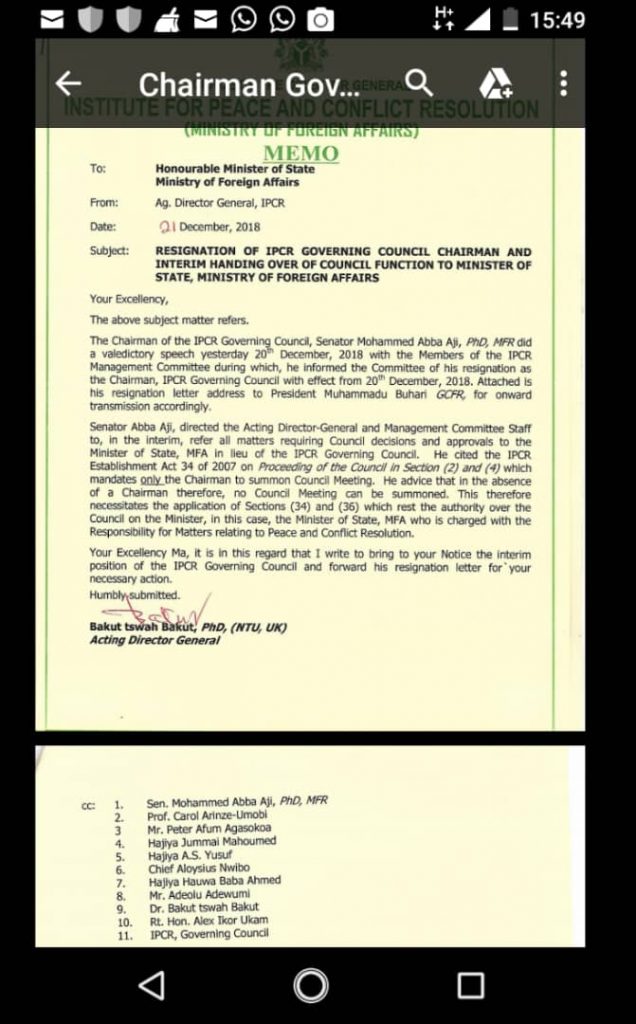
However, it was learnt that the council members have raised objections to the actions of the acting director-general and purported backing of Abba-Ibrahim and the council chairman.
“This is really getting funny that someone will interpret the Act upside down to the extent of determining the existence or non-existence of council members (that President appointed not even MFA) because a chairman has resigned. This is a joke too far and unprecedented in Nigeria,” one of the council members who spoke on the condition of anonymity said after hearing about the development.
But Bakut who spoke to Global Sentinel insisted that his actions were legitimate since it is only the MFA and auditor-general of the federation that has a supervisory role over him, adding that the council members are merely acting on part-time basis with no valid roles to play since the resignation of the chairman.
He said: “Have you checked our Act? Go and study the Act. As it is now, when the chairman called for a meeting, they refused. Do you know what the law says? When a chairman called a meeting and the members put it in writing that they are not coming, what does that mean? Is that not gross misconduct?Is it because I have not taken it up to the president? They better be careful what they are doing.
“The law says I account to the minister and auditor-general of the federation. The board are just part-time job and they are asking for things…which is a prerogative of the minister who is overseeing them and the auditor-general. So who should I listen to, my minister in employment or to go and talk to people who are part time, people who are not even willing to work with the chairman who is their head.”
Push Backs: Financial infractions, corruption allegations
Concerned by what it perceived as the unilateral decision being carried Bakut, the council’s sub-committee on finance, budget and general purpose requested for the IPCR’s financial status and three years audited report as well as the financial reports of the National Peace Academy (NPA).
However, this request was turned down by Bakut who in a memo on December 11,2018, stressed that he was being constrained to comply by the IPCR Establishment Act of 2007.
“Sir, you may wish to refer to Part II-Function of Council, Section 7(1). The Council was inaugurated on March 8, 2018 and can only implement the policies it has formulated.
“I wish to refer you to Section 15 (1)-(2) dealing with Annual Estimate and Accounts. You will realise that these are the prerogative of the Minister supervising the Institute and the Auditor-General of the Federation”, the letter read.
Bakut speaking further on these issues told Global Sentinel that Section 34 and 36 of the IPCR Act backed his decisions.
But this has been debunked by sources who spoke to our reporter, stressing: “The man cited section 34 and 36 in isolation. He cited part of it but didn’t read through because if he had read through, he would know that he can’t even cite those sections. This is because even the minister does not have the power to… she can only direct the council.”
Apart from the concerns raised by the council, the allegations of corruption and financial infractions against the IPCR boss have also persisted with a recent petition by anonymous group asking ICPC to investigate the matter.
According to the petition to the ICPC chairman dated January 4, 2019, there is a “monumental and comprehensive corruption taking place in IPCR and the need to investigate and reduce to the barest minimum corruption”.
The petitioner alleged that Bakut had in October 2018 asked three governing council members of the institute including: Peter Afum Agasokowa, Hauwa Baba-Ahmed and Adeolu Adeyemi to travel with him for a programme only to “outmanoeuvre them” by allegedly paying the supposed allowances of the council members worth N7 million to himself through one Orimoloye Oluwaseyi, an account staff of IPCR.
“The money amounting to over N7 million was paid into the staff account, who withdrew it and gave it to the institute account Mr. Sunday Daji who passed it on to Bakut T. Bakut,” a source said.
“The question is how did this grade level 9 officer come about this large sum of money and why it was paid into this account. What job did he do for the institute to deserve such amount being paid into his account.”
This allegations was also corroborated by a source within the institute who alleged that “the trip to South Africa was not approved by council, which gulped close to N25 million. He still came back and used council members names to siphon N7 million as stated in the petition to ICPC”.
Questionable qualifications, conflicting DOBs and dual nationalities
Bakut has also been accused of possessing doubtful academic qualifications and declaration of ages, having assumed office without a verifiable first degree certificate as well as two different date of births (DOBs) in his Nigerian and British passports.
Contained in the petition to the ICPC was a reference suggesting that the acting director-general of IPCR climbed his academic ladder without the basic qualifications.
Sources informed Global Sentinel that unlike other professionals in the institute, Bakut’s academic qualifications did not include a recognisable first degree certification.
“Bakut T. Bakut who claimed to have a PhD (2000) in International Relations without any NYSC discharge or exemption Certificate to become the Acting Director-General in August 2018,since then has ran the place as an emperor,” the petition read.
Bakut was also accused by sources of possible forgery since he has two conflicting date of births, having allegedly claimed to be born in 1958 in his British passport while his Nigerian passport had 1962 as his birthday.
Speaking to Global Sentinel, Bakut did not deny these allegations but explained that there were circumstances behind his academic qualifications and dual nationalities.
According to him, he fulfilled all requirements to have obtained his master’s degree and PhD in the United Kingdom with British citizenship to boot. He said he has not committed any crime either with regards to the British and Nigerian laws respectively.
On his conflicting date of births, Bakut said he was not disturbed about it as such allegations have come up in the past while threatening to deal with those questioning his sincerity.
According to him, there was a genuine reason why he had the two date of births, having had a change of name while studying in Britain from Simon Tswah Bakut to now Bakut Tswah Bakut. He added that he only operates within the laws of the two nationalities independently and could not be held liable for actions considered legitimate under the British law.
He said: “What I am telling you, go and check my British passport, I am a British citizen, and when I am in Britain I use my British passport. When I am in Nigeria I use my Nigerian passport. There is no law that says I cannot use two passports.
On the allegation that he does not have a first degree, he said: “Go and ask the British government who said that with my diploma in international relations…I could go and get a masters degree and become a British citizen.
“They also forgot to tell you that I didn’t even do secondary school. I thought you should get that I didn’t do a secondary school. That I managed to go to Kaduna Poly, you can check that. And also I didn’t go to conventional institution, but I did diploma in international relations in University of London. I don’t know whether those are crimes. I also have a letter of clearance from NYSC not exemption, not discharge, so you can also check that one.”
However, when questioned further on the conflicting date of births he said: “And so? Do you know the circumstances in which I was issued the British passport? Do you know that? That is what you should go and investigate. I am a British citizen for god’s sake, I don’t need to compromise my British citizenship for anything in this country.”
Asked again why did he change his date of birth, he further said: “Now that is why I said, you go and check the British government. I entered Britain as just Simon Bakut. So go and check, and by the way, my change of name is in Britain not Nigeria, go and check. Do you think the British government are stupid? And when I came back to this country, the law is very clear that I am operating under the Nigerian law, not British law, but if anybody wants to challenge the British government he should go ahead and challenge them.
“Before some people wrote that nonsense to the British government. They said, it is none of their business because I came to Nigeria, so any law that is applicable to me is a Nigerian law. If I go back to Britain I use the British law and since I came back for your information, I have been operating as a Nigerian not as a British citizen. But anybody who thinks he knows better, then go and write.”
Petitions to salvage the underwhelming institute
Concerned, the governing council, citing its role under Section 7(1) and (2) of IPCR Act, appealed to President Buhari through the SGF and minister of foreign affairs to break the stalemate that has stalled the ability of the IPCR to maximise its potentials and advance the primary mandate to promote research and facilitate conflict prevention, management and resolution within Nigeria and Africa while entrenching institutional legacy towards the general election.
The council, in its petition on December 18, 2018, noted that the IPCR currently does not have a capable and substantive chief executive coupled with the need for an active and substantive chairman for the council.
According to them, “the lack of vision and capacity of leadership of IPCR and a passive Chairman of Council with political ambition priorities have really hampered the progress”, adding that “the glory of the IPCR at inception as the hub and indispensable reference point for federal government, international organisations and donors for conflict management, insecurity, violence prevention and mitigation is increasingly diluted needing desired recognition and impact”.
The petitioners also lamented that since the inauguration of the maiden council in March 2018, every significant step to advance the IPCR which would have added value to Buhari’s administration “has been carelessly left unaddressed”.
Part of the petition further informed that “key international organisations and diplomatic missions that were hitherto IPCR significant and robust partners at its inception, have privately expressed their dismay in the capacity of leadership and direction of the IPCR which has informed their passive approach to meaningful engagement.
“Indeed, the current evasiveness on the budgetary and expenditure provisions has heightened concerns of financial infractions by the leadership of IPCR. Despite the evasiveness, the Committee members have consistently met to develop strategies to address these challenges. Indeed, the Acting Director-General has arrogantly indicated that the Governing does not have supervisory role over him in this context.
“There has been violations and deliberate neglect among other misconducts for a collective Governing Council approval in relation to travels by leadership of the Institute particularly a recent funded trip to South Africa without recourse to the Council”.
In the same vein, the trade unions of the institute in a letter dated December 18,2018, addressed to the committee on establishment of the governing council, lamenting that all is not well with IPCR.
In the letter signed by the chairman of the Non-Academic Staff Union of Educational and Associated Institutions (NASU), Steve Agbo and Academic Staff Union of Research Institute (ASURI), Akangbe Oladele, they requested for a formal appointment with the council to discuss the challenges bedevilling IPCR with an inactive management.
To this end, the governing council members said they have “with several unsuccessful attempts been unable to meet with the management of the IPCR to harmonise thoughts and vision for the Institute including the development and follow-up on actionable interventions as the cardinal instrument for conflict and insecurity management in Nigeria due to lack of leadership focus from the executive”.
To resolve the impasse, the governing council appealed to the president, secretary to the government of the federation(SGF) and minister of foreign affairs to as a matter of urgency, “consider the immediate appointment of a capable, professional, goal oriented and substantive Director-General for the IPCR; and a dedicated, experienced and distinguished Nigerian as a Chairman of the Governing Council, to give desired impetus to the mandate of the IPCR and it’s Council in order to elevate the policy direction of the administration as we approach elections in 2019”.
They also called on the president, SGF and minister of foreign affairs to “urgently lead the process of recognition and reaffirmation of the IPCR as the primary government agency that promotes research and facilitates conflict prevention, management and resolution within Nigeria and Africa which international organisations should first align or consult with before interventions in Nigeria in order restore the glory of the strategic Institute.
“This is with noticeable concern that several Organisatios and development partners are engaging in peace-building, conflict management and violence prevention activities across the geo-political zones especially in the North East without inputs from or recourse to the IPCR”.
The key but contentious sections of the IPCR Act
Section 7(1) and (2): The Governing Council shall be responsible for the determination of the overall policy of the institute and the formulation of long term plans and budget and ensuring the implementation of such policies and plans; approve the research and training programmes of the Institute; determine the fees to be paid for research, consultations, training and any other services that may be offered by the Institute; and promote or undertake such activities as are expedient or necessary in the opinion of the Council for the discharge of its responsibilities under this Act.
Section 2 and 4: The Chairman and other members of the council shall be appointed by the President of the federal Republic of Nigeria; The Chairman and other members of the Council, other than ex-officio members: shall hold office for a period of 4 years on such terms and conditions as may be specified in their letter of appointment, and may be re-appointed for another period of 4 years and no more.
Section 34 and 36: The Minister may give such directives of a general nature or relating generally to matters of policy with regard to the exercise by the Council of its functions under this Act and the Council shall comply with the directives or cause them to be complied with.
In this Act— “Board of Trustees” means former trustees of the Sani Abacha Foundation for Peace and Unity; “council” means the governing council of the institute established pursuant to section 2 of this Act; “member” includes the chairman of the council; “minister” means the minister charged with the responsibility for matters relating to peace and conflict resolution.
Section 15: The Institute shall, in each year, submit to the minister an estimate of its expenditure and income (including payments to the Institute’s fund) for the next succeeding year; The institute shall keep proper accounts in respect of each year and proper records in relation to those accounts and shall cause its accounts to be audited within six months after the end of each ear by auditors appointed and in accordance with the guidelines supplied by the auditor-general of the federation.
This investigation was originally published by Global Sentinel
Add a comment
